C++中的list(2)//简单复现list中的关键逻辑
前言
-
这一节的主要内容就是:简单复现list中的关键逻辑。同样的,我们这一节也是先粗略的看一眼源码,结合源码,边理解边复现。源码我已经上传到gitee,网址如下:Murphy/博客存档,我们主要看的就是其中的
stl_list.h -
其次就是这一节是有难度的,但是难度很高吗?也不是很高,我尽量捋顺了给大家说清楚。这一节最主要的几个知识点就是:模板、封装、以及数据结构的逻辑。
自我梳理的逻辑
这一部分大家可看可不看,这是我自己梳理的一个逻辑过程,帮助我自己理解list的。大家感兴趣可以看一下,当然也可以直接跳过这部分。
数据结构的逻辑
首先我们知道list容器是一个带头双向循环链表。它和之前的string和vector不一样。链表的底层空间是不连续的,是通过一个一个节点相连形成的。
string类实例化出来的对象实际上是一个字符串或者说字符数组,vector实例化出来的对象实际上就是一个数组,他们空间连续,且可以直接通过new来为数组开辟空间。而且string对象和vector对象中的数组就只是存储目标数据。
而list类实例化出来的对象实际上是一个带头双向循环链表。首先,链表不是数组,链表不能通过new来直接开辟空间。链表是由节点组成的,对链表的管理其实就是对节点的管理。节点的实现是通过结构体来实现的。因为每一个节点中存储的数据不单纯是一个目标数据,还有上一个节点的地址和下一个节点的地址,所以需要用到结构体。上面说过,链表是由节点组成的,对链表的管理其实就是对节点的管理,new无法直接为链表开辟空间,但是new可以为结构体开辟空间。
那么要实现一个list类,它其中的成员变量是什么呢?我们可以先借鉴string和vector,string类我们复现的时候它的成员变量是一个指针(指向数组的指针),一个有效元素个数,一个空间容量大小。因为数组底层空间连续,那么只要知道了首元素的地址(也就是指向数组的那个指针),那么就可以通过对指针进行加减访问到每一个数据。
vector类复现的时候是有三个指针,分别指向数组首元素的地址,有效元素结束位置,数组空间结束位置。同样的,最主要的就是数组首元素地址,因为知道首元素地址之后就可以访问到别的元素。
到了list类,因为我们要实现带头的双向循环链表,那么我们想通过一个简单的成员变量就能找到全部成员,那么我们这里list类的成员变量应该就是:指向头节点的指针。知道头节点的位置之后,我们就可以通过头节点中记录的下一个节点的地址,找到下一个节点,以此类推,找到全部节点。
那么list类中的成员变量需要包含size(有效元素个数)和capacity(容量大小)吗?
那么很明显是不需要的,首先链表的节点是按需开辟,当需要有一个新节点的时候直接创建一个就ok了,它不像数组那样底层空间连续,开辟空间就一整块的开,链表是有一个数据进来的时候开辟一个节点的空间。所以就不涉及到容量大小capacity的问题。size的存在其实主要是与capacity区别开,且方便判断容量占用是否已满,用处其实也不大,因为在链表中,全都是有效元素,它不像vector和string类中的数组,由于空间可能会有冗余,所以才会有有效元素和容量大小的概念。
所以list类是不需要size和capacity这两个成员变量的,而且类里面也会提供size( )函数,所以size更没必要存在了。
带头双向循环链表是一个很不错的数据结构,能极大的方便我们程序员管理数据。
封装&&模板
在list中,我们就可以很明显的感觉到C++的封装和C++借助封装和模板来实现泛型编程的思想。在这一节,你首先得明白list类是什么样的,为什么是这样,也就是上面刚刚说的数据结构的逻辑,然后便是封装思想。封装其实不是什么很高级的东西,但是它就是很有用。
这里的封装主要体现在两个地方,一方面是:类,一方面是:迭代器。list类其实就是对带头双向循环链表的一个封装,并且通过模板来实现存储不同类型的数据。
C++借助类的封装和模板,我们可以发现我们学习的容器在表面上都很相似,用法也十分相似。这其实就是封装和模板的作用。首先我们学习容器的时候,可以发现C++提供的接口都很相似,用法相似,这能极大的帮助我们上手学习C++的容器。其次,当我们真正去实现C++的容器的时候又会发现它们的底层是不一样的,这就带来另一个好处就是,隐藏底层实现细节。
在这一节中,list类对带头双向循环链表的封装是比较容易理解的。但是迭代器对节点指针的封装就比较难理解了。
一方面list的迭代器不同于我们前面学的string和vector,我们在学习vector和string的时候可能感觉他们的迭代器实现很简单,不就是指针嘛。但是要知道,它们底层的物理空间是连续的,所以它们的原生指针(没有经过封装的指针)就是天然迭代器。只需要给它们的原生指针改个名字叫迭代器就行了。
那为什么底层物理空间连续的容器,它们的原生指针就能直接做迭代器呢?迭代器,迭代器,顾名思义,迭代,遍历数据用的。这里我们就拿vector来举例,当我们知道了首元素地址,也就是it=begin( )的时候,我们每对it进行一次++,it就会指向下一个元素。对it解引用就是数据本身。
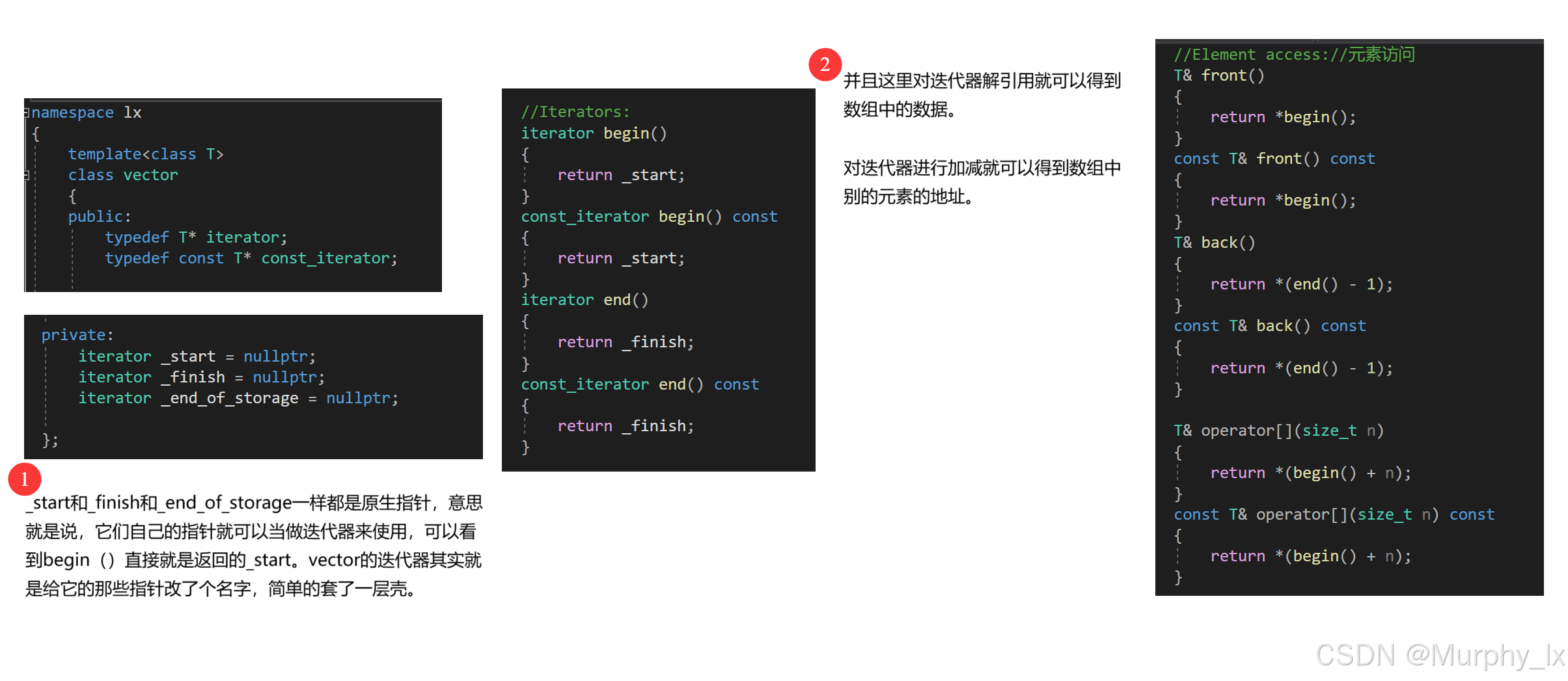
但是,链表中节点的指针能直接当迭代器吗?假设我们直接使用链表中节点的指针做迭代器。同样是it=begin( ),当我们对it++的时候,it会指向什么地方?指向下一个节点吗?很明显,不一定。因为链表的底层物理空间不是连续的,所以对it++的时候(也就是对节点指针++)是无法准确的找到下一个节点的。
同样,当我们对it解引用的时候,也就是*it,我们可以得到存储的有效数据吗?很明显,也不行,为啥,因为it其实就是结构体指针,解引用之后就是结构体,结构体里面有前后节点的地址以及有效数据,我们无法直接通过对it解引用来获得我们想要的有效数据。
之前我们学习vector和string的时候,都是直接把原生指针改个名,改成iterator直接用。现在不行了。我们直接对结构体指针改个名,无法实现我们想要的结果。
我们想要的是:当我们对迭代器加减的时候能准确的找到前后节点的位置,对迭代器解引用能直接获得有效数据。
那么我们想实现这样的功能,我们目前只能借助函数重载来实现(我也不知道还有什么办法,我也才刚开始学)。
要知道所有的迭代器底层都是指针。我们要通过函数重载,使得迭代器的动作符合我们的要求。更改迭代器动作实质上就是更改结构体指针的动作逻辑,让结构体指针++的时候不是传统意义上的++,而是找到下一个节点的地址。
所以我们要对结构体指针的行为进行运算符重载来达到我们的目的。
但是,运算符重载的一个要求就是该类型是自定义类型,就好比如我们最开始学习的时候的时间类,我们可以使用运算符重载,使得时间类++是什么结果,–是什么结果。
所以,我们要对结构体指针进行封装,封装成一个自定义类型,然后在这个自定义类型里面,重载++和–和解引用等逻辑。
然后我们再对这个自定义类型改个名(iterator),这样我们就得到我们想要的迭代器了。
那么这里其实就有两层封装,一层是对结构体指针进行封装得到一个我们可以操作的自定义类型,一层是对自定义类型进行封装成迭代器。
那么list容器整体的重难点我已经梳理完了,接下来代码的讲解中我也会结合的讲。
源码
这里我也给大家把源码贴出来:
/*** Copyright (c) 1994* Hewlett-Packard Company** Permission to use, copy, modify, distribute and sell this software* and its documentation for any purpose is hereby granted without fee,* provided that the above copyright notice appear in all copies and* that both that copyright notice and this permission notice appear* in supporting documentation. Hewlett-Packard Company makes no* representations about the suitability of this software for any* purpose. It is provided "as is" without express or implied warranty.*** Copyright (c) 1996,1997* Silicon Graphics Computer Systems, Inc.** Permission to use, copy, modify, distribute and sell this software* and its documentation for any purpose is hereby granted without fee,* provided that the above copyright notice appear in all copies and* that both that copyright notice and this permission notice appear* in supporting documentation. Silicon Graphics makes no* representations about the suitability of this software for any* purpose. It is provided "as is" without express or implied warranty.*//* NOTE: This is an internal header file, included by other STL headers.* You should not attempt to use it directly.*/#ifndef __SGI_STL_INTERNAL_LIST_H
#define __SGI_STL_INTERNAL_LIST_H__STL_BEGIN_NAMESPACE#if defined(__sgi) && !defined(__GNUC__) && (_MIPS_SIM != _MIPS_SIM_ABI32)
#pragma set woff 1174
#endiftemplate <class T>
struct __list_node {typedef void* void_pointer;void_pointer next;void_pointer prev;T data;
};template<class T, class Ref, class Ptr>
struct __list_iterator {typedef __list_iterator<T, T&, T*> iterator;typedef __list_iterator<T, const T&, const T*> const_iterator;typedef __list_iterator<T, Ref, Ptr> self;typedef bidirectional_iterator_tag iterator_category;typedef T value_type;typedef Ptr pointer;typedef Ref reference;typedef __list_node<T>* link_type;typedef size_t size_type;typedef ptrdiff_t difference_type;link_type node;__list_iterator(link_type x) : node(x) {}__list_iterator() {}__list_iterator(const iterator& x) : node(x.node) {}bool operator==(const self& x) const { return node == x.node; }bool operator!=(const self& x) const { return node != x.node; }reference operator*() const { return (*node).data; }#ifndef __SGI_STL_NO_ARROW_OPERATORpointer operator->() const { return &(operator*()); }
#endif /* __SGI_STL_NO_ARROW_OPERATOR */self& operator++() { node = (link_type)((*node).next);return *this;}self operator++(int) { self tmp = *this;++*this;return tmp;}self& operator--() { node = (link_type)((*node).prev);return *this;}self operator--(int) { self tmp = *this;--*this;return tmp;}
};#ifndef __STL_CLASS_PARTIAL_SPECIALIZATIONtemplate <class T, class Ref, class Ptr>
inline bidirectional_iterator_tag
iterator_category(const __list_iterator<T, Ref, Ptr>&) {return bidirectional_iterator_tag();
}template <class T, class Ref, class Ptr>
inline T*
value_type(const __list_iterator<T, Ref, Ptr>&) {return 0;
}template <class T, class Ref, class Ptr>
inline ptrdiff_t*
distance_type(const __list_iterator<T, Ref, Ptr>&) {return 0;
}#endif /* __STL_CLASS_PARTIAL_SPECIALIZATION */template <class T, class Alloc = alloc>
class list {
protected:typedef void* void_pointer;typedef __list_node<T> list_node;typedef simple_alloc<list_node, Alloc> list_node_allocator;
public: typedef T value_type;typedef value_type* pointer;typedef const value_type* const_pointer;typedef value_type& reference;typedef const value_type& const_reference;typedef list_node* link_type;typedef size_t size_type;typedef ptrdiff_t difference_type;public:typedef __list_iterator<T, T&, T*> iterator;typedef __list_iterator<T, const T&, const T*> const_iterator;#ifdef __STL_CLASS_PARTIAL_SPECIALIZATIONtypedef reverse_iterator<const_iterator> const_reverse_iterator;typedef reverse_iterator<iterator> reverse_iterator;
#else /* __STL_CLASS_PARTIAL_SPECIALIZATION */typedef reverse_bidirectional_iterator<const_iterator, value_type,const_reference, difference_type>const_reverse_iterator;typedef reverse_bidirectional_iterator<iterator, value_type, reference,difference_type>reverse_iterator;
#endif /* __STL_CLASS_PARTIAL_SPECIALIZATION */protected:link_type get_node() { return list_node_allocator::allocate(); }void put_node(link_type p) { list_node_allocator::deallocate(p); }link_type create_node(const T& x) {link_type p = get_node();__STL_TRY {construct(&p->data, x);}__STL_UNWIND(put_node(p));return p;}void destroy_node(link_type p) {destroy(&p->data);put_node(p);}protected:void empty_initialize() { node = get_node();node->next = node;node->prev = node;}void fill_initialize(size_type n, const T& value) {empty_initialize();__STL_TRY {insert(begin(), n, value);}__STL_UNWIND(clear(); put_node(node));}#ifdef __STL_MEMBER_TEMPLATEStemplate <class InputIterator>void range_initialize(InputIterator first, InputIterator last) {empty_initialize();__STL_TRY {insert(begin(), first, last);}__STL_UNWIND(clear(); put_node(node));}
#else /* __STL_MEMBER_TEMPLATES */void range_initialize(const T* first, const T* last) {empty_initialize();__STL_TRY {insert(begin(), first, last);}__STL_UNWIND(clear(); put_node(node));}void range_initialize(const_iterator first, const_iterator last) {empty_initialize();__STL_TRY {insert(begin(), first, last);}__STL_UNWIND(clear(); put_node(node));}
#endif /* __STL_MEMBER_TEMPLATES */protected:link_type node;public:list() { empty_initialize(); }iterator begin() { return (link_type)((*node).next); }const_iterator begin() const { return (link_type)((*node).next); }iterator end() { return node; }const_iterator end() const { return node; }reverse_iterator rbegin() { return reverse_iterator(end()); }const_reverse_iterator rbegin() const { return const_reverse_iterator(end()); }reverse_iterator rend() { return reverse_iterator(begin()); }const_reverse_iterator rend() const { return const_reverse_iterator(begin());} bool empty() const { return node->next == node; }size_type size() const {size_type result = 0;distance(begin(), end(), result);return result;}size_type max_size() const { return size_type(-1); }reference front() { return *begin(); }const_reference front() const { return *begin(); }reference back() { return *(--end()); }const_reference back() const { return *(--end()); }void swap(list<T, Alloc>& x) { __STD::swap(node, x.node); }iterator insert(iterator position, const T& x) {link_type tmp = create_node(x);tmp->next = position.node;tmp->prev = position.node->prev;(link_type(position.node->prev))->next = tmp;position.node->prev = tmp;return tmp;}iterator insert(iterator position) { return insert(position, T()); }
#ifdef __STL_MEMBER_TEMPLATEStemplate <class InputIterator>void insert(iterator position, InputIterator first, InputIterator last);
#else /* __STL_MEMBER_TEMPLATES */void insert(iterator position, const T* first, const T* last);void insert(iterator position,const_iterator first, const_iterator last);
#endif /* __STL_MEMBER_TEMPLATES */void insert(iterator pos, size_type n, const T& x);void insert(iterator pos, int n, const T& x) {insert(pos, (size_type)n, x);}void insert(iterator pos, long n, const T& x) {insert(pos, (size_type)n, x);}void push_front(const T& x) { insert(begin(), x); }void push_back(const T& x) { insert(end(), x); }iterator erase(iterator position) {link_type next_node = link_type(position.node->next);link_type prev_node = link_type(position.node->prev);prev_node->next = next_node;next_node->prev = prev_node;destroy_node(position.node);return iterator(next_node);}iterator erase(iterator first, iterator last);void resize(size_type new_size, const T& x);void resize(size_type new_size) { resize(new_size, T()); }void clear();void pop_front() { erase(begin()); }void pop_back() { iterator tmp = end();erase(--tmp);}list(size_type n, const T& value) { fill_initialize(n, value); }list(int n, const T& value) { fill_initialize(n, value); }list(long n, const T& value) { fill_initialize(n, value); }explicit list(size_type n) { fill_initialize(n, T()); }#ifdef __STL_MEMBER_TEMPLATEStemplate <class InputIterator>list(InputIterator first, InputIterator last) {range_initialize(first, last);}#else /* __STL_MEMBER_TEMPLATES */list(const T* first, const T* last) { range_initialize(first, last); }list(const_iterator first, const_iterator last) {range_initialize(first, last);}
#endif /* __STL_MEMBER_TEMPLATES */list(const list<T, Alloc>& x) {range_initialize(x.begin(), x.end());}~list() {clear();put_node(node);}list<T, Alloc>& operator=(const list<T, Alloc>& x);protected:void transfer(iterator position, iterator first, iterator last) {if (position != last) {(*(link_type((*last.node).prev))).next = position.node;(*(link_type((*first.node).prev))).next = last.node;(*(link_type((*position.node).prev))).next = first.node; link_type tmp = link_type((*position.node).prev);(*position.node).prev = (*last.node).prev;(*last.node).prev = (*first.node).prev; (*first.node).prev = tmp;}}public:void splice(iterator position, list& x) {if (!x.empty()) transfer(position, x.begin(), x.end());}void splice(iterator position, list&, iterator i) {iterator j = i;++j;if (position == i || position == j) return;transfer(position, i, j);}void splice(iterator position, list&, iterator first, iterator last) {if (first != last) transfer(position, first, last);}void remove(const T& value);void unique();void merge(list& x);void reverse();void sort();#ifdef __STL_MEMBER_TEMPLATEStemplate <class Predicate> void remove_if(Predicate);template <class BinaryPredicate> void unique(BinaryPredicate);template <class StrictWeakOrdering> void merge(list&, StrictWeakOrdering);template <class StrictWeakOrdering> void sort(StrictWeakOrdering);
#endif /* __STL_MEMBER_TEMPLATES */friend bool operator== __STL_NULL_TMPL_ARGS (const list& x, const list& y);
};template <class T, class Alloc>
inline bool operator==(const list<T,Alloc>& x, const list<T,Alloc>& y) {typedef typename list<T,Alloc>::link_type link_type;link_type e1 = x.node;link_type e2 = y.node;link_type n1 = (link_type) e1->next;link_type n2 = (link_type) e2->next;for ( ; n1 != e1 && n2 != e2 ;n1 = (link_type) n1->next, n2 = (link_type) n2->next)if (n1->data != n2->data)return false;return n1 == e1 && n2 == e2;
}template <class T, class Alloc>
inline bool operator<(const list<T, Alloc>& x, const list<T, Alloc>& y) {return lexicographical_compare(x.begin(), x.end(), y.begin(), y.end());
}#ifdef __STL_FUNCTION_TMPL_PARTIAL_ORDERtemplate <class T, class Alloc>
inline void swap(list<T, Alloc>& x, list<T, Alloc>& y) {x.swap(y);
}#endif /* __STL_FUNCTION_TMPL_PARTIAL_ORDER */#ifdef __STL_MEMBER_TEMPLATEStemplate <class T, class Alloc> template <class InputIterator>
void list<T, Alloc>::insert(iterator position,InputIterator first, InputIterator last) {for ( ; first != last; ++first)insert(position, *first);
}#else /* __STL_MEMBER_TEMPLATES */template <class T, class Alloc>
void list<T, Alloc>::insert(iterator position, const T* first, const T* last) {for ( ; first != last; ++first)insert(position, *first);
}template <class T, class Alloc>
void list<T, Alloc>::insert(iterator position,const_iterator first, const_iterator last) {for ( ; first != last; ++first)insert(position, *first);
}#endif /* __STL_MEMBER_TEMPLATES */template <class T, class Alloc>
void list<T, Alloc>::insert(iterator position, size_type n, const T& x) {for ( ; n > 0; --n)insert(position, x);
}template <class T, class Alloc>
list<T,Alloc>::iterator list<T, Alloc>::erase(iterator first, iterator last) {while (first != last) erase(first++);return last;
}template <class T, class Alloc>
void list<T, Alloc>::resize(size_type new_size, const T& x)
{iterator i = begin();size_type len = 0;for ( ; i != end() && len < new_size; ++i, ++len);if (len == new_size)erase(i, end());else // i == end()insert(end(), new_size - len, x);
}template <class T, class Alloc>
void list<T, Alloc>::clear()
{link_type cur = (link_type) node->next;while (cur != node) {link_type tmp = cur;cur = (link_type) cur->next;destroy_node(tmp);}node->next = node;node->prev = node;
}template <class T, class Alloc>
list<T, Alloc>& list<T, Alloc>::operator=(const list<T, Alloc>& x) {if (this != &x) {iterator first1 = begin();iterator last1 = end();const_iterator first2 = x.begin();const_iterator last2 = x.end();while (first1 != last1 && first2 != last2) *first1++ = *first2++;if (first2 == last2)erase(first1, last1);elseinsert(last1, first2, last2);}return *this;
}template <class T, class Alloc>
void list<T, Alloc>::remove(const T& value) {iterator first = begin();iterator last = end();while (first != last) {iterator next = first;++next;if (*first == value) erase(first);first = next;}
}template <class T, class Alloc>
void list<T, Alloc>::unique() {iterator first = begin();iterator last = end();if (first == last) return;iterator next = first;while (++next != last) {if (*first == *next)erase(next);elsefirst = next;next = first;}
}template <class T, class Alloc>
void list<T, Alloc>::merge(list<T, Alloc>& x) {iterator first1 = begin();iterator last1 = end();iterator first2 = x.begin();iterator last2 = x.end();while (first1 != last1 && first2 != last2)if (*first2 < *first1) {iterator next = first2;transfer(first1, first2, ++next);first2 = next;}else++first1;if (first2 != last2) transfer(last1, first2, last2);
}template <class T, class Alloc>
void list<T, Alloc>::reverse() {if (node->next == node || link_type(node->next)->next == node) return;iterator first = begin();++first;while (first != end()) {iterator old = first;++first;transfer(begin(), old, first);}
} template <class T, class Alloc>
void list<T, Alloc>::sort() {if (node->next == node || link_type(node->next)->next == node) return;list<T, Alloc> carry;list<T, Alloc> counter[64];int fill = 0;while (!empty()) {carry.splice(carry.begin(), *this, begin());int i = 0;while(i < fill && !counter[i].empty()) {counter[i].merge(carry);carry.swap(counter[i++]);}carry.swap(counter[i]); if (i == fill) ++fill;} for (int i = 1; i < fill; ++i) counter[i].merge(counter[i-1]);swap(counter[fill-1]);
}#ifdef __STL_MEMBER_TEMPLATEStemplate <class T, class Alloc> template <class Predicate>
void list<T, Alloc>::remove_if(Predicate pred) {iterator first = begin();iterator last = end();while (first != last) {iterator next = first;++next;if (pred(*first)) erase(first);first = next;}
}template <class T, class Alloc> template <class BinaryPredicate>
void list<T, Alloc>::unique(BinaryPredicate binary_pred) {iterator first = begin();iterator last = end();if (first == last) return;iterator next = first;while (++next != last) {if (binary_pred(*first, *next))erase(next);elsefirst = next;next = first;}
}template <class T, class Alloc> template <class StrictWeakOrdering>
void list<T, Alloc>::merge(list<T, Alloc>& x, StrictWeakOrdering comp) {iterator first1 = begin();iterator last1 = end();iterator first2 = x.begin();iterator last2 = x.end();while (first1 != last1 && first2 != last2)if (comp(*first2, *first1)) {iterator next = first2;transfer(first1, first2, ++next);first2 = next;}else++first1;if (first2 != last2) transfer(last1, first2, last2);
}template <class T, class Alloc> template <class StrictWeakOrdering>
void list<T, Alloc>::sort(StrictWeakOrdering comp) {if (node->next == node || link_type(node->next)->next == node) return;list<T, Alloc> carry;list<T, Alloc> counter[64];int fill = 0;while (!empty()) {carry.splice(carry.begin(), *this, begin());int i = 0;while(i < fill && !counter[i].empty()) {counter[i].merge(carry, comp);carry.swap(counter[i++]);}carry.swap(counter[i]); if (i == fill) ++fill;} for (int i = 1; i < fill; ++i) counter[i].merge(counter[i-1], comp);swap(counter[fill-1]);
}#endif /* __STL_MEMBER_TEMPLATES */#if defined(__sgi) && !defined(__GNUC__) && (_MIPS_SIM != _MIPS_SIM_ABI32)
#pragma reset woff 1174
#endif__STL_END_NAMESPACE #endif /* __SGI_STL_INTERNAL_LIST_H */// Local Variables:
// mode:C++
// End:观察源码
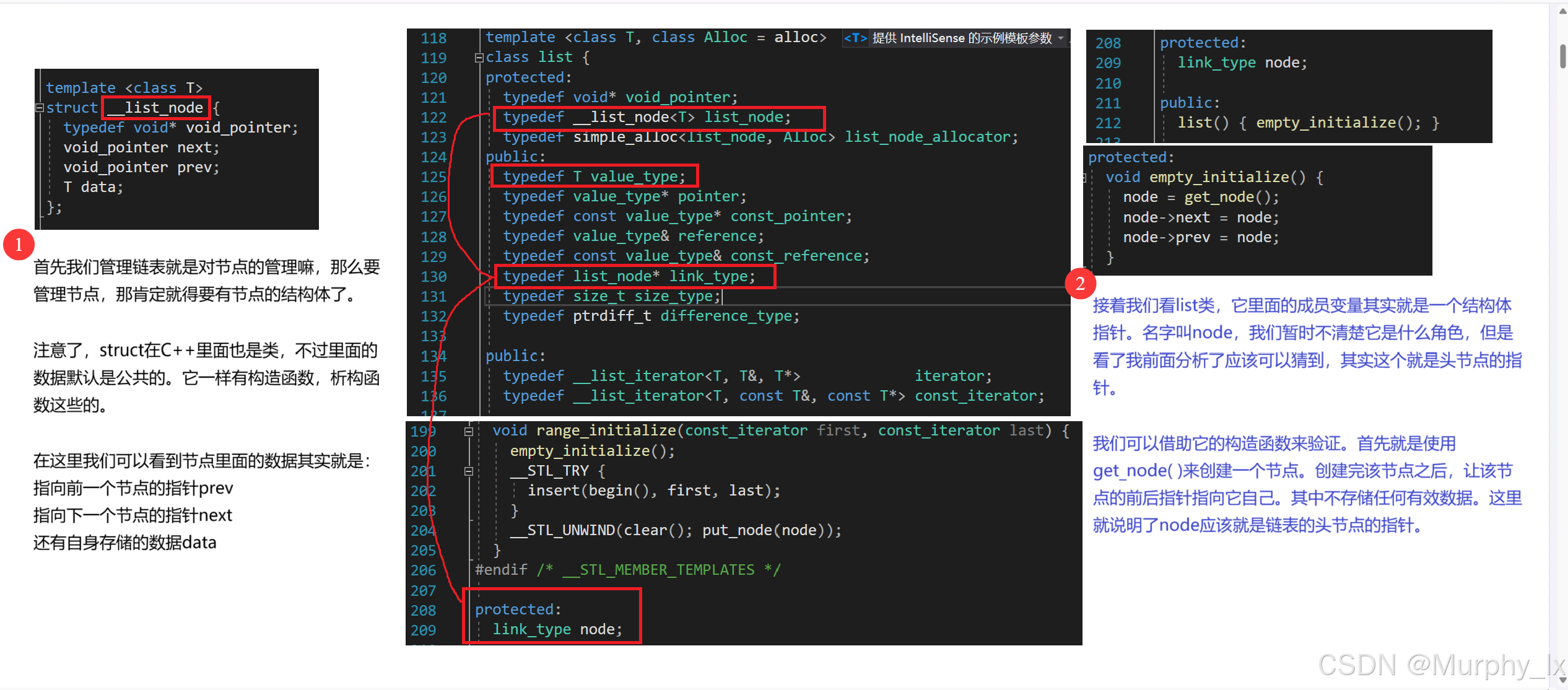
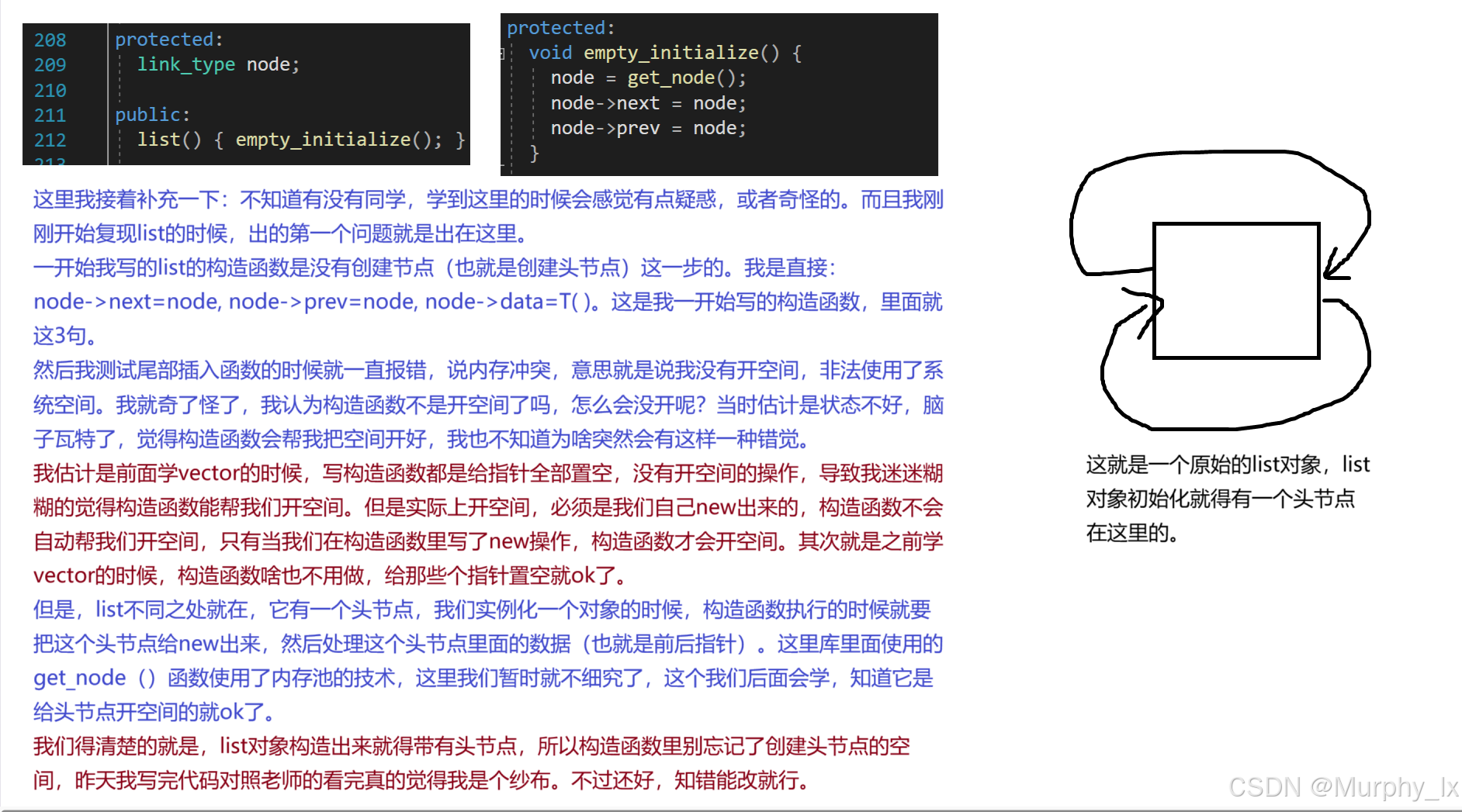
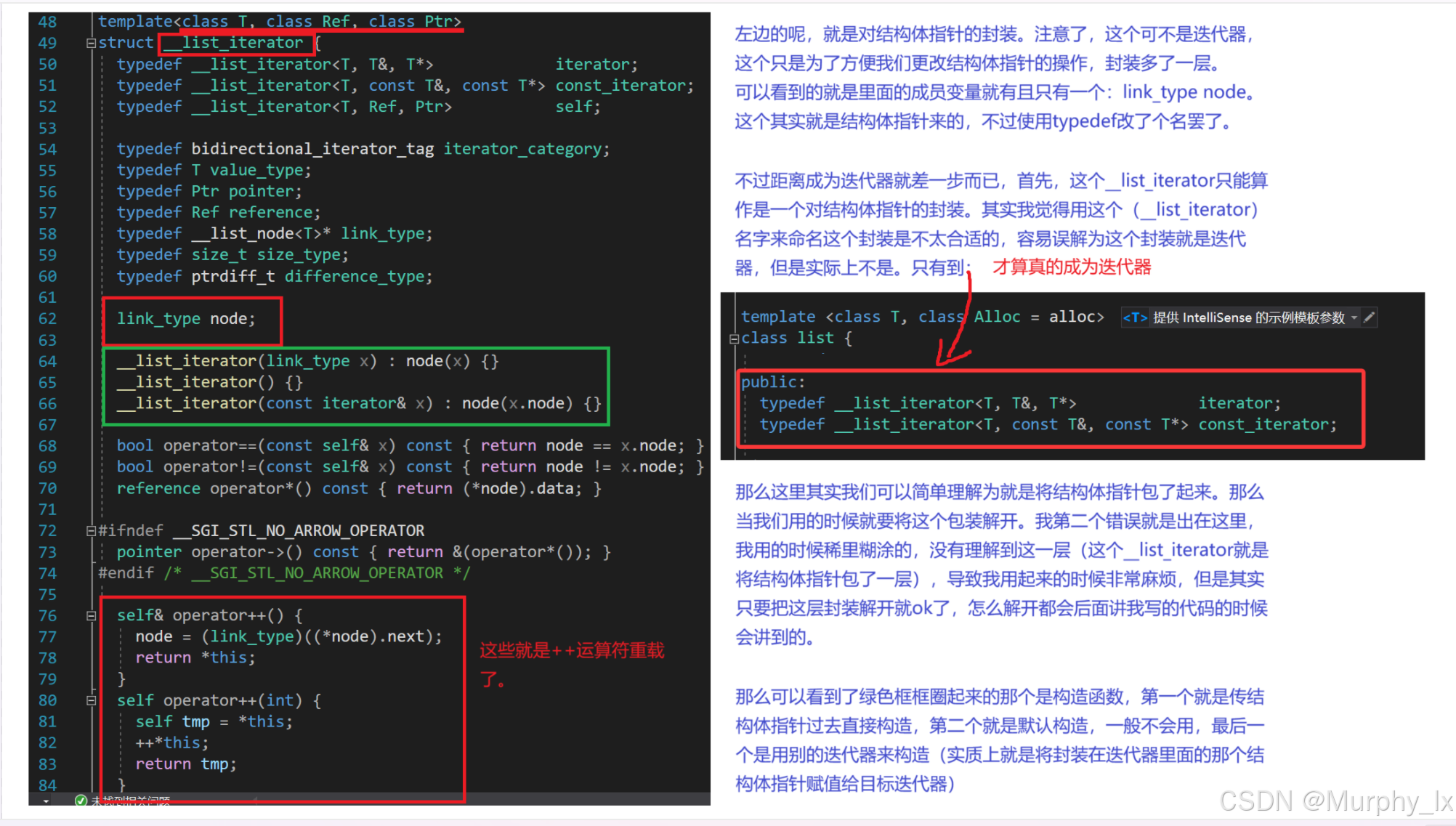
看到这里,也该到我们自己动手写一个出来了,我先把我的代码贴出来给大家:
复现源码
list.h
#pragma once
#include<cassert>namespace lx
{template <class T>struct ListNode{ListNode<T>* next;ListNode<T>* prev;T data;ListNode(const T& x=T()):next(nullptr),prev(nullptr),data(x){}};template <class T, class Ref, class Ptr>struct __list_iterator{typedef __list_iterator<T, const T&, const T*> const_iterator;typedef __list_iterator<T, T&, T*> iterator;typedef __list_iterator<T, Ref, Ptr> Self;typedef ListNode<T>* Node;Node _node;__list_iterator(Node node) : _node(node) {}__list_iterator() {}__list_iterator(const iterator& x) : _node(x._node) {}//重载bool operator==(const Self& x) const{return _node == x._node;}bool operator!=(const Self& x) const{return _node != x._node;}//解引用重载Ref operator*() const{return _node->data;}//箭头重载Ptr operator->(){return &(_node->data);//return &(operator*());}//前置++Self& operator++(){_node = _node->next;return *this;}//后置++Self operator++(int){Self tmp = *this;++ *this;return tmp;}//前置--Self& operator--(){_node = _node->prev;return *this;}//后置--Self operator--(int){Self tmp = *this;-- *this;return tmp;}};template <class T>class list{public:typedef __list_iterator<T, T&, T*> iterator;typedef __list_iterator<T, const T&, const T*> const_iterator;void empty_init(){_head = new node;_head->next = _head;_head->prev = _head;}list(){empty_init();}~list(){clear();delete _head;_head = nullptr;}list(const list<T>& x){empty_init();/*iterator it = x.begin();while (it != x.end()){push_back(*it);}*/for (const auto& e : x){push_back(e);}}/*list<T>& operator=(const list<T>& x){if (this != &x){clear();for (const auto& e : x){push_back(e);}}return *this;}*/list<T>& operator=(list<T> x){swap(x);return *this;}//iterator begin(){//return iterator(_head->next);return _head->next;}iterator end(){//return iterator(_head);return _head;}const_iterator begin() const{//return iterator(_head->next);return _head->next;}const_iterator end() const{//return iterator(_head);return _head;}//bool empty() const{//return _head->prev == _head;return _head->next == _head;}size_t size() const{size_t count = 0;const_iterator it = begin();while (it != end()){++count;++it;}return count;}//T& front(){return *(begin());}const T& front() const{return *(begin());}T& back(){return *(--end());}const T& back() const{return *(--end());}//void swap(list<T>& x){std::swap(_head, x._head);}iterator insert(iterator position, const T& val){assert(position._node);node* cur = position._node;node* prev = cur->prev;node* newnode = new node(val);prev->next = newnode;newnode->prev = prev;newnode->next = cur;cur->prev = newnode;//return iterator(newnode);return newnode;}iterator erase(iterator position){assert(position._node);assert(!empty());node* cur = position._node;node* next = cur->next;node* prev = cur->prev;delete cur;prev->next = next;next->prev = prev;//return iterator(next);return next;}void push_back(const T& val){node* tail = _head->prev;node* newnode = new node(val);tail->next = newnode;newnode->prev = tail;newnode->next = _head;_head->prev = newnode;}/*void push_back(const T& val){insert(end(), val);}*/void push_front(const T& val){node* cur = begin()._node;node* newnode = new node(val);_head->next = newnode;newnode->prev = _head;newnode->next = cur;cur->prev = newnode;}/*void push_front(const T& val){insert(begin(), val);}*/void pop_back(){assert(!empty());node* cur = _head->prev;node* prev = cur->prev;delete cur;prev->next = _head;_head->prev = prev;}/*void pop_back(){erase(--end());}*/void pop_front(){assert(!empty());node* cur = begin()._node;node* next = cur->next;delete cur;_head->next = next;next->prev = _head;}/*void pop_front(){erase(begin());}*/void resize(size_t n, T val = T()){if (n != size()){if (n > size()){size_t len = n - size();for (size_t i = 0; i < len; i++){push_back(val);}}else{size_t len = size() - n;for (size_t i = 0; i < len; i++){pop_back();}}} }void clear(){assert(!empty());iterator it = begin();while (it != end()){it=erase(it);}}private:typedef ListNode<T> node;node* _head;};}
test.cpp//测试使用
#include<iostream>
using namespace std;#include"list.h"namespace lx
{void test1(){list<int> l1;l1.push_back(1);l1.push_back(2);l1.push_back(3);l1.push_back(4);l1.push_back(5);auto it = l1.begin();while (it != l1.end()){cout << *it << " ";++it;}cout << endl;//////l1.push_front(11);l1.push_front(22);l1.push_front(33);l1.push_front(44);it = l1.begin();while (it != l1.end()){cout << *it << " ";++it;}cout << endl;/////l1.pop_front();l1.pop_front();l1.pop_front();l1.pop_front();it = l1.begin();while (it != l1.end()){cout << *it << " ";++it;}cout << endl;/////l1.pop_back();l1.pop_back();l1.pop_back();l1.pop_back();it = l1.begin();while (it != l1.end()){cout << *it << " ";++it;}cout << endl;l1.resize(7, 99);it = l1.begin();while (it != l1.end()){cout << *it << " ";++it;}cout << endl;l1.resize(1);it = l1.begin();while (it != l1.end()){cout << *it << " ";++it;}cout << endl;}
}int main()
{lx::test1();return 0;
}
复现代码讲解
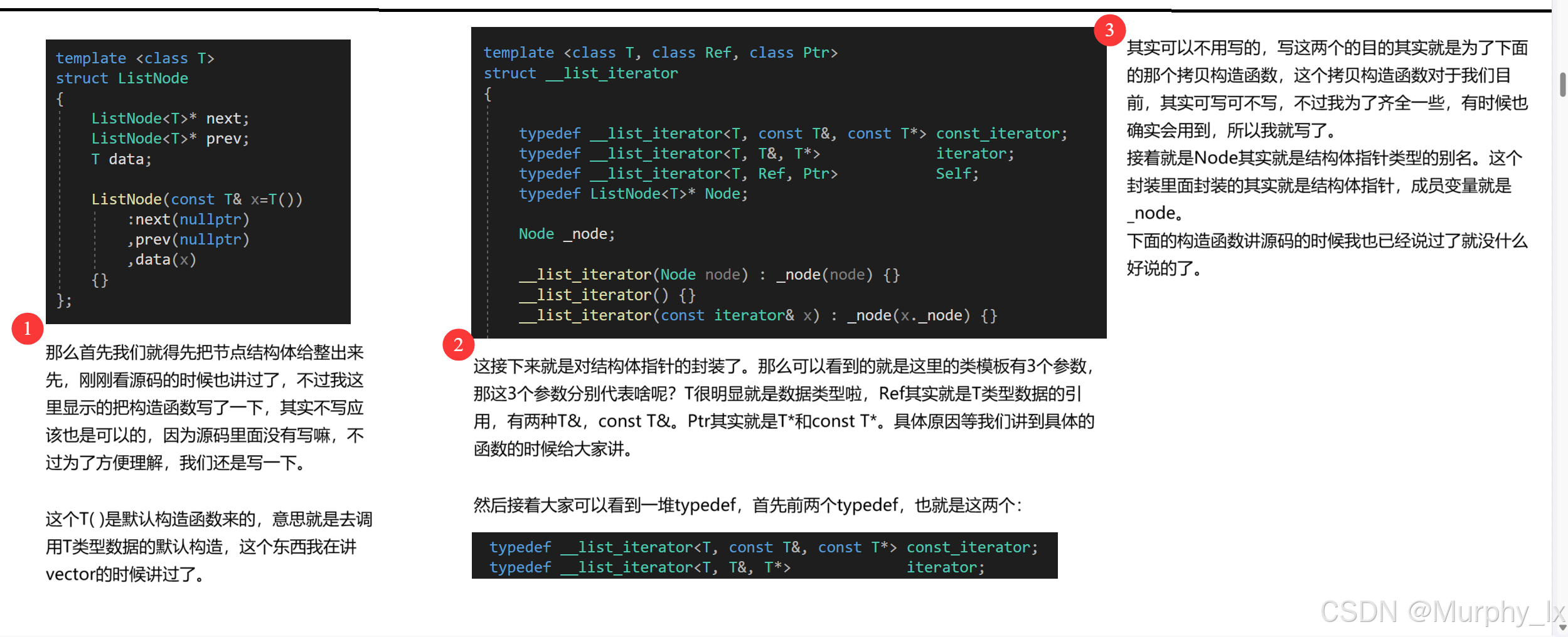
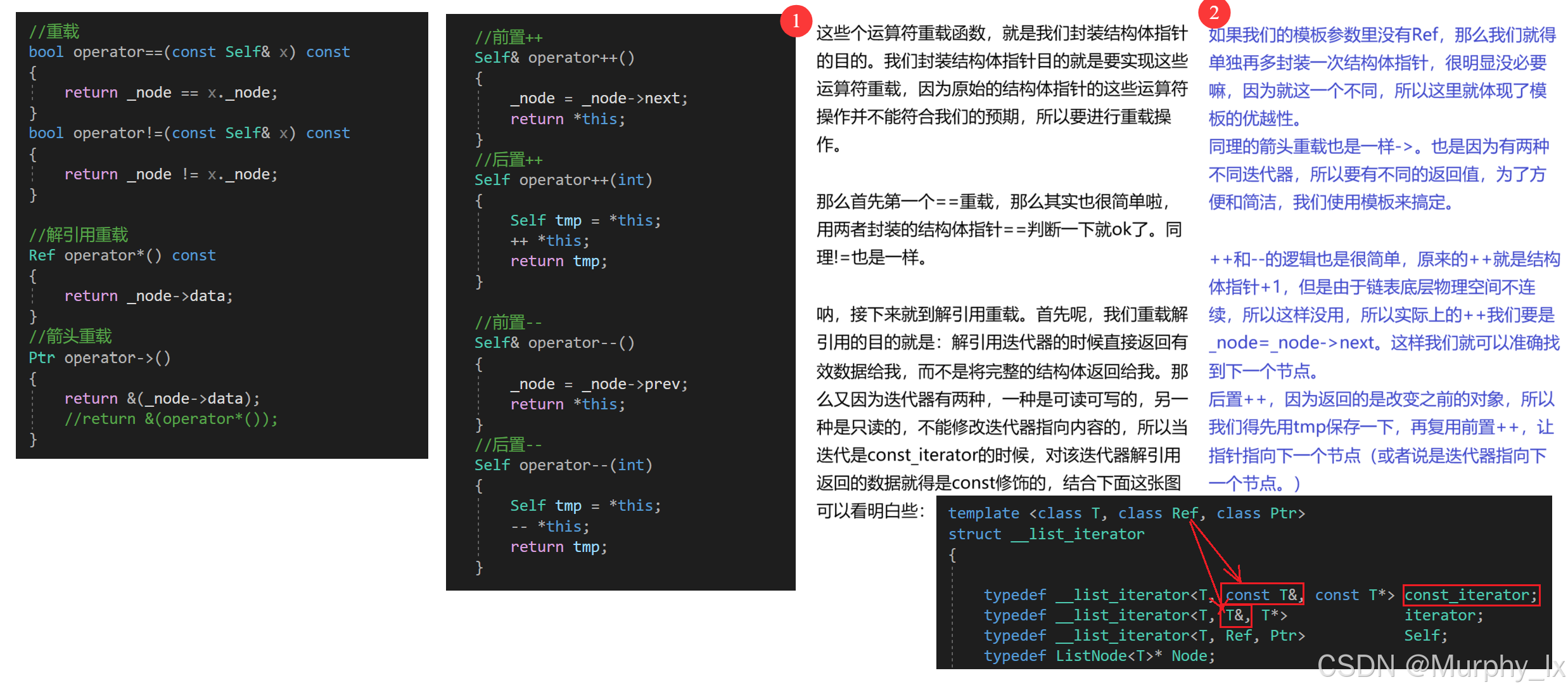
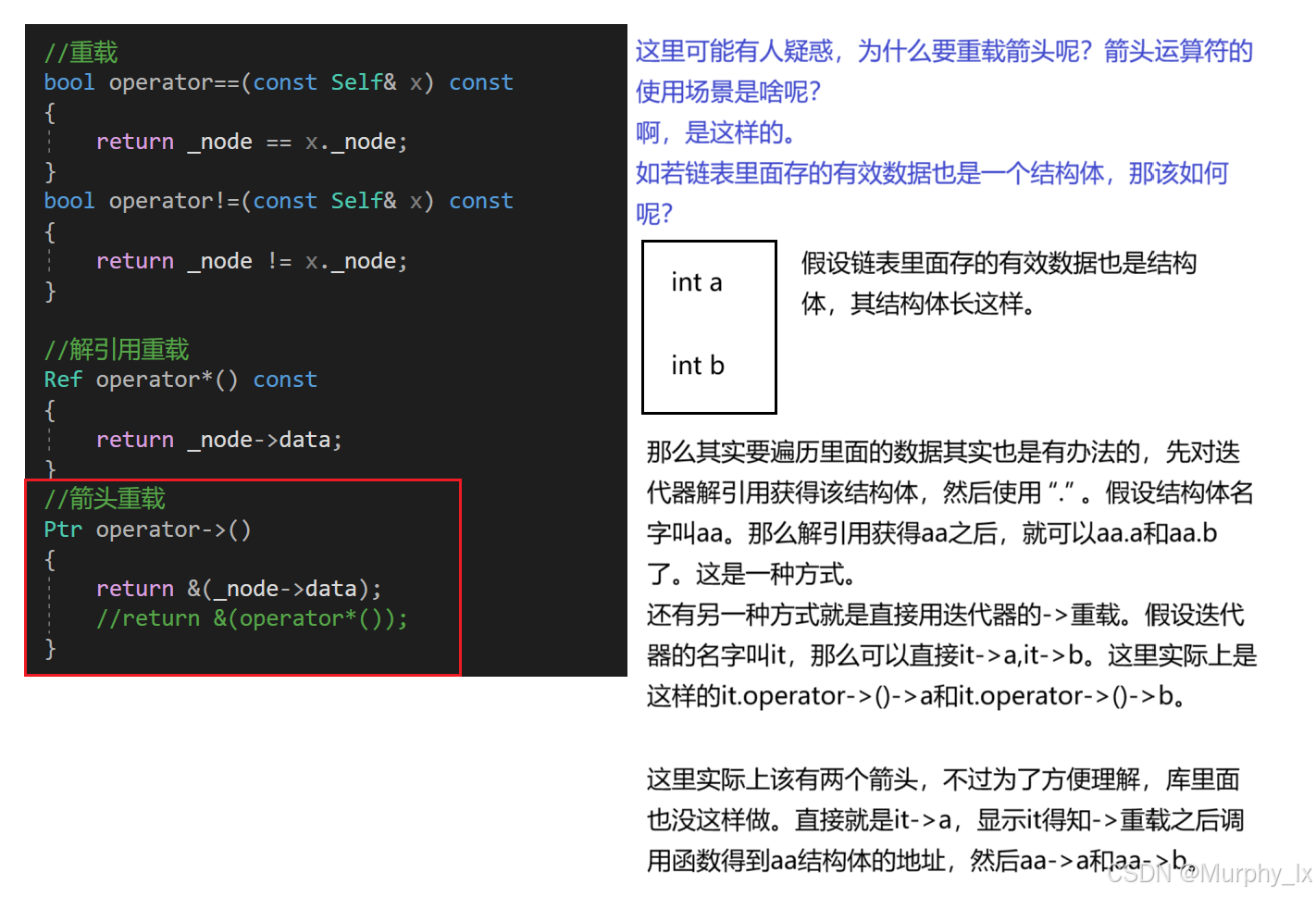
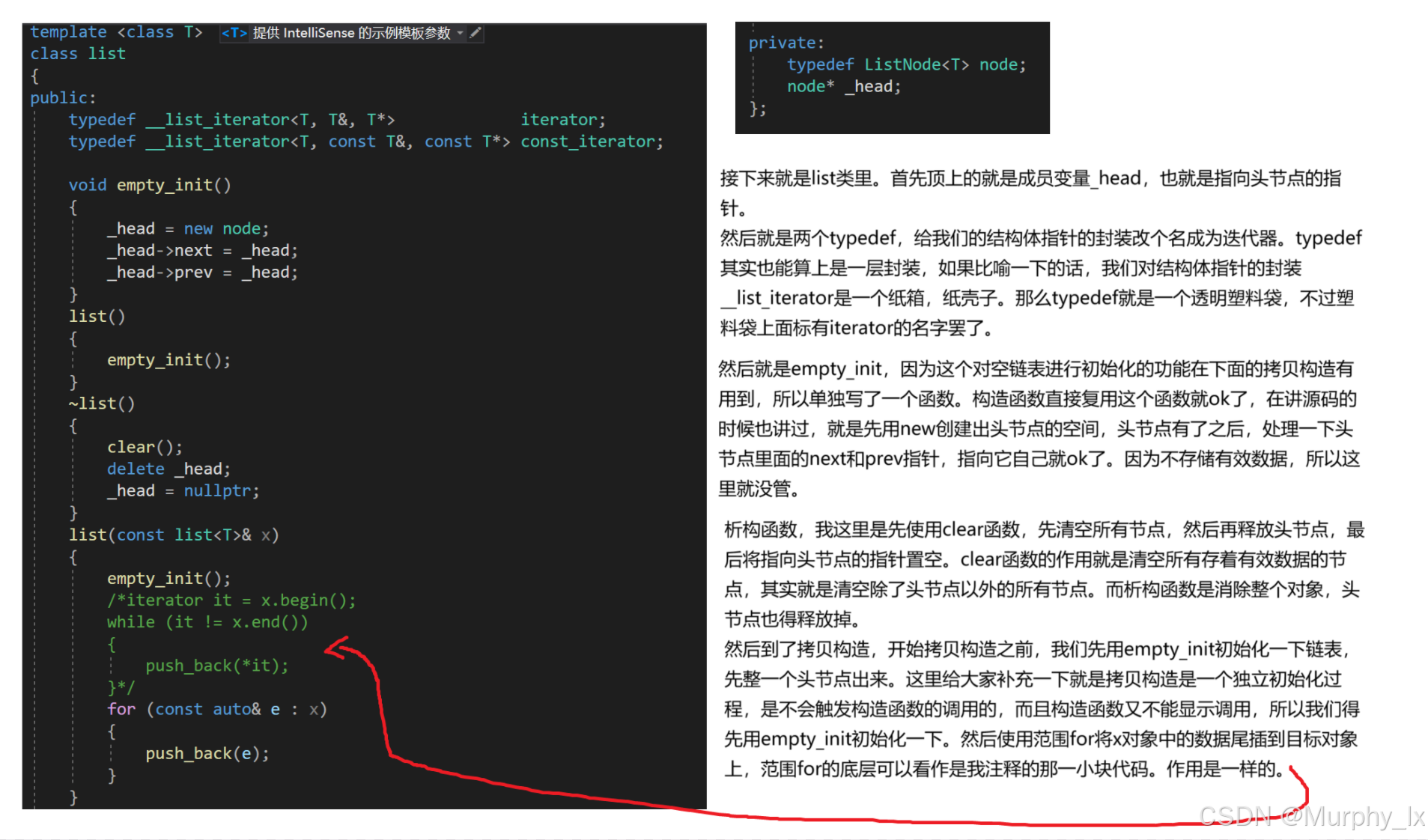
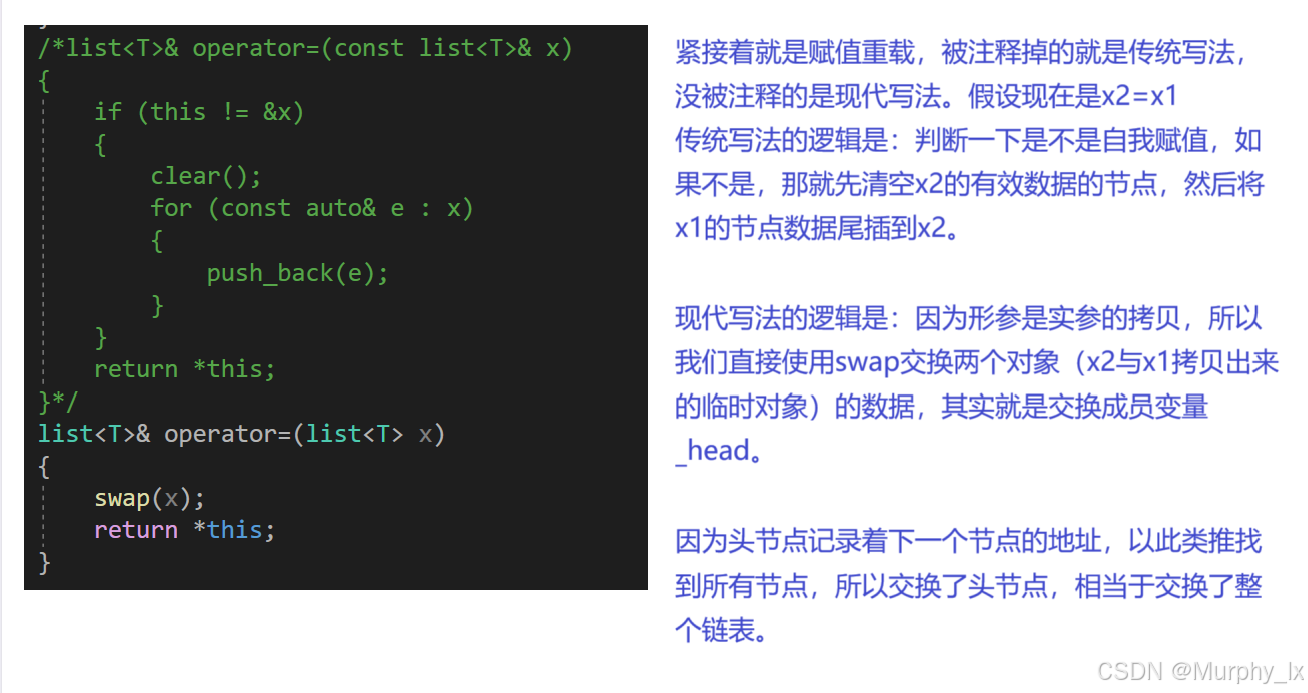
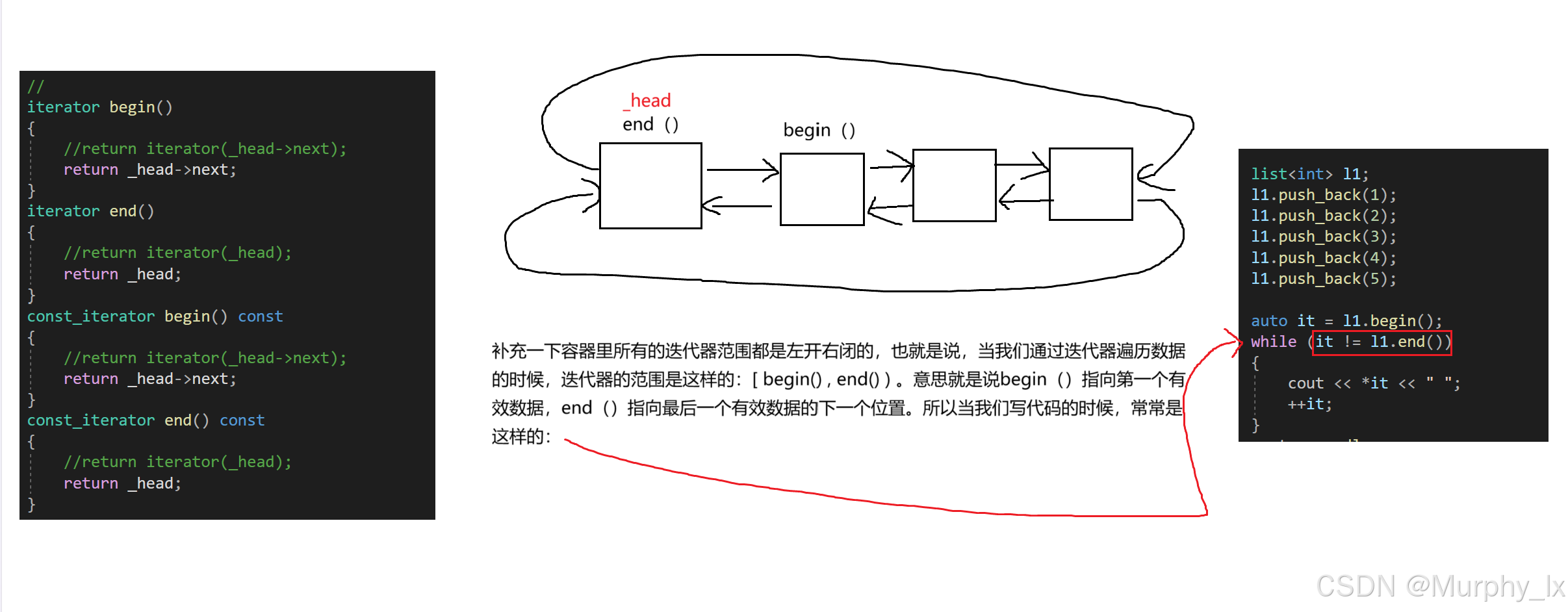
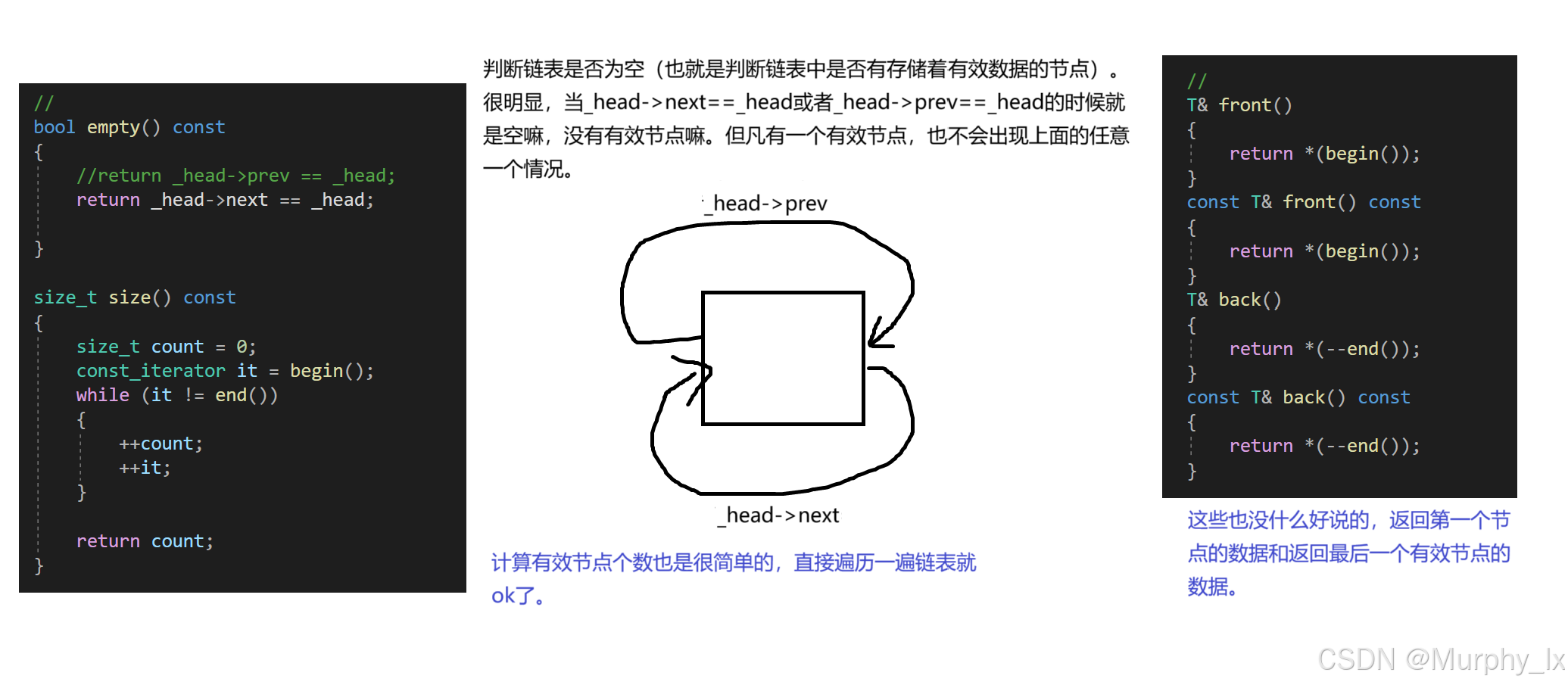
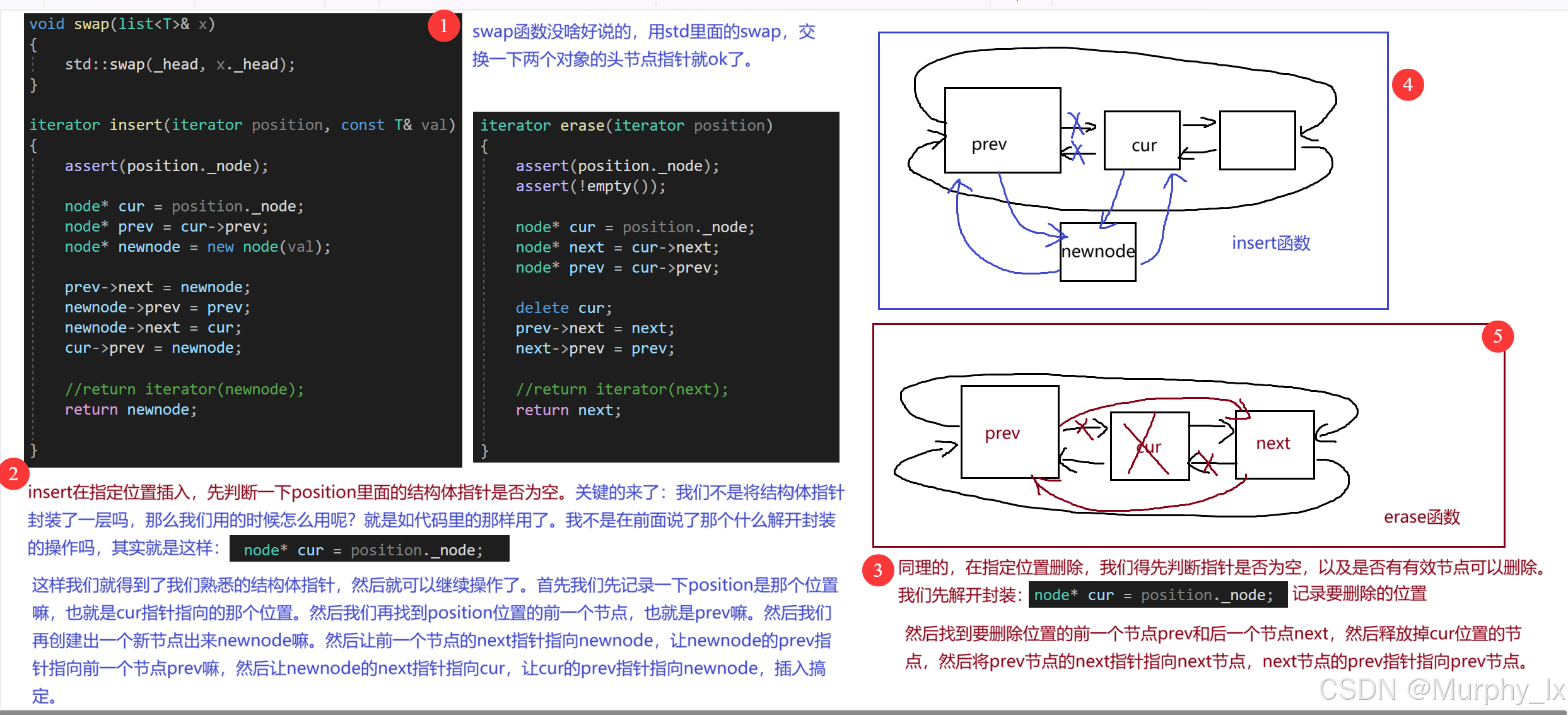
后续的什么push_back(插入逻辑和insert一样,画画图就能明白)昂和resize呀,clear昂,都很简单了的,看代码完全能看懂的。(注释掉的代码表示的是另一种方法。)
这里简单说一下resize的作用:分为两种,当n大于原来的size()的时候,就是插入n-size()个节点。n小于原来的size()的时候就是删除size()-n个节点,也就是复用push_back和pop_back两个函数。

:Python 的基本数据类型——复数)


:Python 的基本数据类型——浮点数)




_位运算优化)









